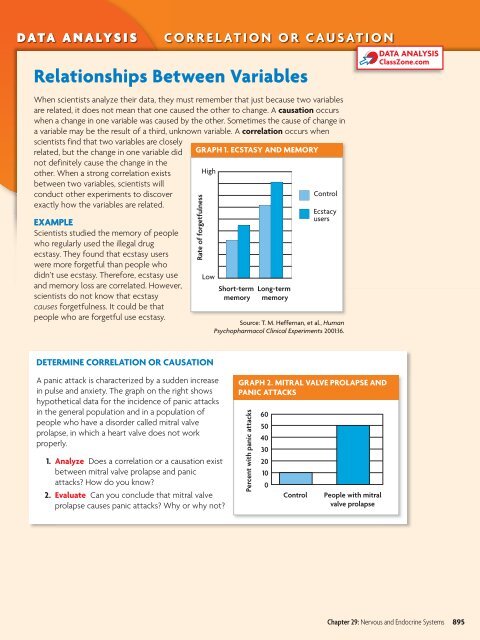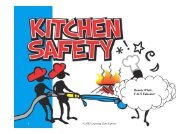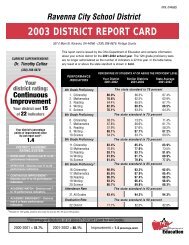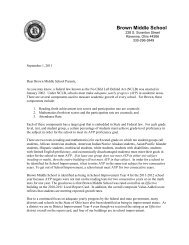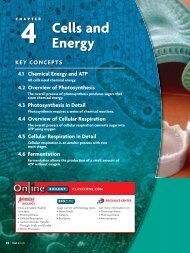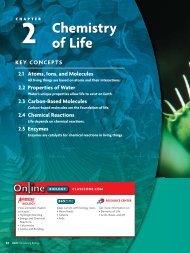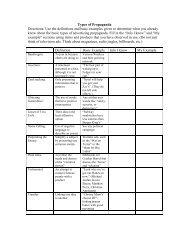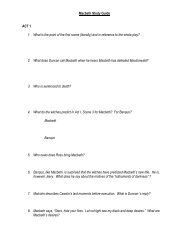DATA ANALYSISRelationships Between VariablesWhen scientists analyze their data, they must remember that just because two variablesare related, it does not mean that one caused the other to change. A causation occurswhen a change in one variable was caused by the other. Sometimes the cause of change ina variable may be the result of a third, unknown variable. A correlation occurs whenscientists find that two variables are closelyrelated, but the change in one variable didnot definitely cause the change in theother. When a strong correlation existsbetween two variables, scientists willconduct other experiments to discoverexactly how the variables are related.EXAMPLEScientists studied the memory of peoplewho regularly used the illegal drugecstasy. They found that ecstasy userswere more forgetful than people whodidn’t use ecstasy. Therefore, ecstasy use<strong>and</strong> memory loss are correlated. However,scientists do not know that ecstasycauses forgetfulness. It could be thatpeople who are forgetful use ecstasy.CORRELATION OR CAUSATIONGRAPH 1. ECSTASY AND MEMORYRate of forgetfulnessHighLowShort-termmemoryLong-termmemoryControlEcstacyusersSource: T. M. Heffernan, et al., HumanPsychopharmacol Clinical Experiments 2001:16.DATA ANALYSISClassZone.comDETERMINE CORRELATION OR CAUSATIONA panic attack is characterized by a sudden increasein pulse <strong>and</strong> anxiety. The graph on the right showshypothetical data for the incidence of panic attacksin the general population <strong>and</strong> in a population ofpeople who have a disorder called mitral valveprolapse, in which a heart valve does not workproperly.1. Analyze Does a correlation or a causation existbetween mitral valve prolapse <strong>and</strong> panicattacks? How do you know?2. Evaluate Can you conclude that mitral valveprolapse causes panic attacks? Why or why not?GRAPH 2. MITRAL VALVE PROLAPSE ANDPANIC ATTACKSPercent with panic attacks6050403020100ControlPeople with mitralvalve prolapseChapter 29: <strong>Nervous</strong> <strong>and</strong> <strong>Endocrine</strong> <strong>Systems</strong> 895
29.6The <strong>Endocrine</strong> System<strong>and</strong> HormonesKEY CONCEPT The endocrine system produces hormones that affect growth,development, <strong>and</strong> homeostasis.MAIN IDEAS• Hormones influence a cell’s activities by entering thecell or binding to its membrane.• <strong>Endocrine</strong> gl<strong>and</strong>s secrete hormones that actthroughout the body.• The hypothalamus interacts with the nervous <strong>and</strong>endocrine systems.• Hormonal imbalances can cause serious illness.VOCABULARYhormone, p. 896gl<strong>and</strong>, p. 896hypothalamus, p. 898pituitary gl<strong>and</strong>, p. 898releasing hormones, p. 900Connect If you hear a loud BANG, your brain tells your body that you could be indanger. You might need to run away or defend yourself. Your brain alerts yourendocrine system to send out chemicals that will speed up your heart rate,increase blood flow to your muscles, <strong>and</strong> get you ready for action.hormonebloodstreamreceptorFIGURE 29.18 Gl<strong>and</strong>s releasehormones into the bloodstream,but hormones will only affectcells that have receptors for thosehormones.MAIN IDEAHormones influence a cell’s activities by enteringthe cell or binding to its membrane.The endocrine system makes chemical signals that help the body grow, develop,<strong>and</strong> maintain homeostasis. Some of these chemicals control processessuch as cell division, cell death, <strong>and</strong> sexual development. Others help youmaintain homeostasis by affecting body temperature, alertness, or salt levels.The chemical signals made by the endocrine system aretarget cell called hormones. Hormones are made in organs called gl<strong>and</strong>s,which are found in many different areas of the body. Gl<strong>and</strong>srelease hormones into the bloodstream, as shown inFIGURE 29.18. As a hormone moves through the body, itcomes into contact with many different cells. But it willinteract only with a cell that has specific membranereceptors. If the hormone touches a cell that does not havea matching receptor, nothing happens. If it touches a cellthat has the correct receptors, it binds to the cell <strong>and</strong>not a target cell prompts the cell to make certain proteins or enzymes. Cellsthat have receptors for a hormone are called the target cellsof that hormone.All hormones belong to one of two categories: steroid hormones <strong>and</strong>nonsteroid hormones. All steroid hormones are made of cholesterol, a type oflipid. On the other h<strong>and</strong>, there are three types of nonsteroid hormones thatare made up of one or more amino acids.896 Unit 9: Human Biology


